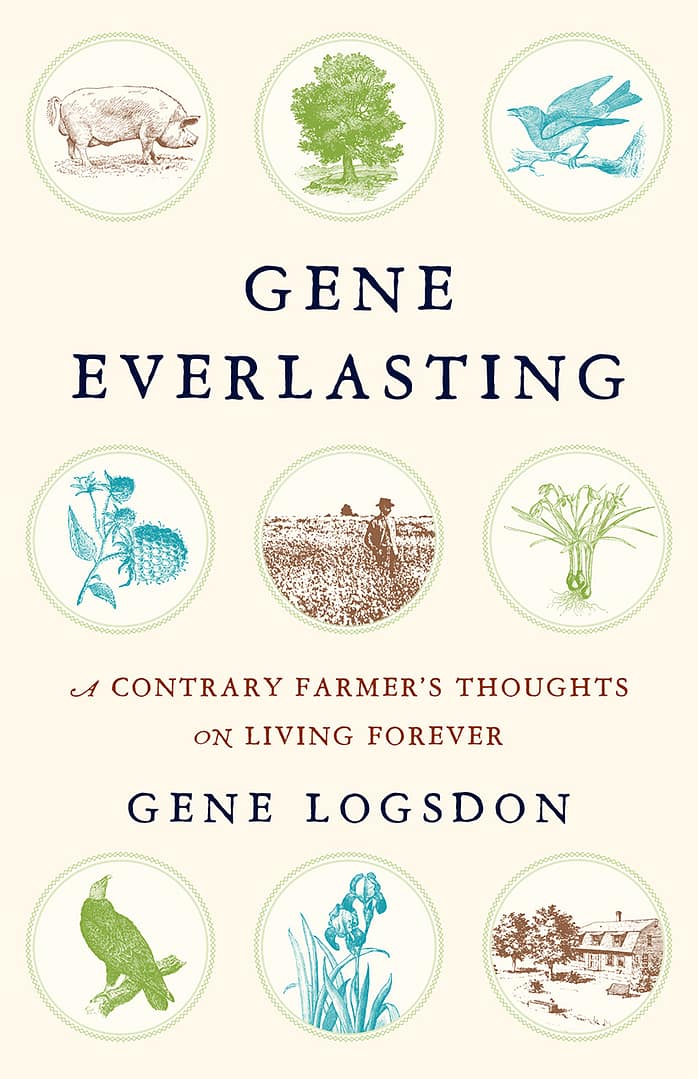Gene Everlasting
A Contrary Farmer’s Thoughts on Living Forever
Paperback
$19.95
Author Gene Logsdon—whom Wendell Berry once called “the most experienced and best observer of agriculture we have”—has a notion: That it is a little easier for gardeners and farmers to accept death than the rest of the populace. Why? Because every day, farmers and gardeners help plants and animals begin life and help plants and animals end life. They are intimately attuned to the food chain. They understand how all living things are seated around a dining table, eating while being eaten. They realize that all of nature is in flux.
Gene Everlasting contains Logsdon’s reflections, by turns both humorous and heart-wrenching, on nature, death, and eternity, all from a contrary farmer’s perspective. He recounts joys and tragedies from his childhood in the 1930s and ‘40s spent on an Ohio farm, through adulthood and child-raising, all the way up to his recent bout with cancer, always with an eye toward the lessons that farming has taught him about life and its mysteries.
Whether his subject is parsnips, pigweed, immortality, irises, green burial, buzzards, or compound interest, Logsdon generously applies as much heart and wit to his words as he does care and expertise to his fields.
Reviews and Praise
Booklist-
"In a prolific career stretching back to the early 1970s, Logsdon has penned hundreds of farm and garden articles, four novels, and nearly two dozen nonfiction books on topics ranging from cutting wood to managing manure. Now entering his ninth decade, Logsdon turns his attention here to his own, and everyone else’s, unavoidable demise. In 21 contemplative and often trenchantly witty essays, the author ruminates over a wide variety of religious and materialistic ideas about death and finds the greatest comfort in the notion that, when his body returns to the soil, it will provide sustenance for new life. Logsdon praises the contemporary trend toward burials in biodegradable caskets and takes a jaundiced view of beliefs in a blissful, never-ending afterlife. Related pieces review his mother’s last week of life, the reasons people commit suicide, and an “immortal” herbicide-resistant weed. While his legion of fans may pale at the thought that Logsdon has just written his swan song, his recent remission from cancer offers hope that his writing days are far from over.”
More Reviews and Praise
Shelf Awareness, Starred Review-
"As anyone who has lived on a farm can attest, one is closer to life and death when dealing with nature and animals on a daily basis. The poetic prose of Gene Logsdon's Gene Everlasting, a reflection on life as an Ohio farmer, brings readers into that close connection of beginnings and endings, the inner, always-turning circle of chores, natural discoveries and seasonal work.
Logsdon (A Sanctuary of Trees) blends careful observations of the natural world with sometimes humorous, often melancholic contemplations that gently lead the reader to ponder such topics as the death of a beloved pet, the mysterious nature of cemeteries, the number of suicides in any given year, butchering hogs, buzzards in the backyard and the sudden uptick in backyard farms and gardens. He expertly intertwines these seemingly disconnected subjects with the cyclic qualities of nature and the overall sense that life and death are forever paired—that one cannot and should not exist without the other, thereby removing the fear of death.
Logsdon also eloquently reveals early childhood memories and his fears of the meaning of everlasting hell, his acceptance of his mother's untimely death and his own need to confront death when diagnosed with cancer. The culminating effect is not morbid, but philosophical and absorbing, like a musical fugue that builds and recedes, gracefully moving toward an acceptance and understanding of what living and dying truly mean.”
Publishers Weekly-
"Dryly humorous, intelligently original, and at times poetic, Logsdon (A Sanctuary of Trees) muses and wisecracks about cycles of life and death, nature’s resilience, and humanity’s follies from the rolling hills and changing seasons of his farm in Sandusky, Ohio, just steps from where he grew up, as he finds himself still alive after a bout with cancer. The themes of these short essays vary widely: the hypocrisy of money-lending and compound interest; the need for 'secret crying places'; the breathtaking but 'awesomely eerie' wonder of buzzards: 'nothing symbolizes better the reality of farm and garden, bustling with life but always near to death,' he writes. Logsdon seems to have taken to heart the lessons he’s gleaned from parsnips: 'cultivate an independent kind of ornery reliability…, develop a distinctive personality… appreciated by the few rather than the many…, don’t try to look too pretty… you’ll be asked to head up a fund-raiser.' Great bedtime reading, these succinct, thought-provoking, life-affirming essays are a perfect gift for your favorite gardener, nature lover, philosopher, or curmudgeon."
Kirkus Reviews-
STARRED REVIEW: "A self-proclaimed contrarian and octogenarian cancer survivor finds renewal in the prospect of death while raising issues that challenge science and religion alike. Though Logsdon (A Sanctuary of Trees, 2012) loves nature as much as the next writer and more than most, he refuses to indulge in the usual sentimentality and poetics of nature writing in this series of interconnected essays that combine plainspoken prose, cleareyed observation and provocative thought. There is plenty here to annoy environmental alarmists, Christians, Republicans, agribusiness, vegetarians (or anyone else bothered by the detailed, don’t-read-before-dinner description of killing and butchering) and others who subscribe to various forms of conventional wisdom. 'I write this book believing that the human race, including myself, is irrational,' he says. 'But being irrational is not all bad….Nevertheless, totally contradicting everything I have written above (another mark of human insanity), I really do intend this book to be a comfort and a solace for those people facing death. And that means all of us.' The author maintains that despite 'much hand-wringing over diseases that are attacking oak trees…as long as climate dictates trees, trees in one form or another will be here.' The perceptual problem, says the writer who once studied to be a priest, is that 'the human mind sees cycles because we think in terms of beginnings and endings, of causes and effects, of time passing. But the forest acts only in the everlasting NOW.' And that 'everlasting NOW' provides perspective and comfort throughout these meditations on mortality and renewal, particularly after the author’s cancer diagnosis. He experienced an epiphany during the final spring he thought he might not experience: 'I wanted May to last forever. But now I understood that it was only because nature changed every month, every day, every moment, that it could come again. Only through change is permanence achieved….To understand immortality, embrace mortality.' Wisdom and experience permeate this perceptive and understatedly well-written meditation."











